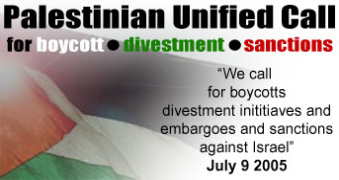"Rothchild advocates divestment from Israel"November 12, 2010
In the
Brandeis Hoot, at Brandeis University, at:
http://thebrandeishoot.com/articles/9100A small group of people met on Tuesday night for an intimate discussion with Alice Rothchild on the possibility of utilizing a BDS-boycott, divestment, sanctions-strategy in order to counter the Israeli occupation of the West Bank.
Alice Rothchild is a gynecologist and obstetrician who has been politically active throughout her life, and particularly so in attempting to promote social justice for the Palestinians. She has gone on many trips to Israel to learn about the conditions in the West Bank. Rothchild is also particularly notable for the recent publication of the second edition of her book, “Broken Promises, Broken Dreams: The Stories of Jewish and Palestinian Trauma and Resilience.”
The event was sponsored by Brandeis Students for Justice in Palestine and Jewish Voice for Peace, and was entitled “Difficult Conversations: Alice Rothchild on BDS.” The event started off with Alice speaking about her views on the occupation as well as Israel in general, and then she made her way into speaking about BDS as a method to solve what she sees as a crucial problem. She took a chance at the beginning of her speech to acknowledge the controversy of her ideas.
“So what I’m going to do,” she stated, “is invite you to step outside the box. I am speaking to share, not to convince. I don’t have to prove that I’m right, but I want to share with you how things look to me.” She also acknowledged that “Boycott, divestment, and sanctions is probably the most difficult topic in the Jewish community today.” However, she also argued the point that it is not uncommon for ideas which seem radical to be accepted with time.
“I think it’s important,” Rothchild stated, “to remember that there are a lot of radical ideas that were once really difficult that are now mainstream, like Zionism,” which Rothchild characterized today as “the litmus test for being a good Jew.”
Throughout her speech, the common theme was one of bemoaning the conditions of the Palestinian people, primarily in the West Bank, but also touching on Gaza and Israel Proper. She described the negative effects of the 500 to 600 checkpoints along the Green Line, as well as within West Bank Borders through explaining how sometimes women going into labor are delayed at the checkpoints and wind up not being able to make it to the hospital. She also talked about how sometimes Palestinians are restricted from walking along certain streets, even if the street in question is in front of their house. Generally, she likens the control of the Palestinians by Israel to any other oppression throughout history, seeing everything as a pattern of one party controlling and oppressing another.
“Change Arab to Native American, African-American and Japanese and obvious parallels emerge with our own legacies of colonialism, slavery, segregation, detention camps and civil rights struggles”.
She used all of this description of the plight of the Palestinians in order to show how this is a serious problem which needs to be solved, and she believes it can be solved through BDS. Boycott, divestment and sanctions, as described by Rothchild, is a method of using the economy in order to promote social justice. It could be as simple as not buying hummus made in the West Bank. Perhaps labels could be put on products coming from the West Bank which state their origin explicitly. While Rothchild admitted early on in her speech that it is a controversial idea, she argued that BDS is an integral part of social justice movements and is perfectly acceptable.
“BDS is an old tradition. It is a part of activist tradition. It dates back in the US to the 1700s to the Quakers who refused to do business with slave owners…It’s been used against apartheid South Africa…It was used by Jews who boycotted goods made in Nazi Germany.”
She then came to the question, as she explained, of “why BDS now?” She responded by saying simply, “and I think what I’ve heard, over and over again is ‘everything else has been tried’.”
After Rothchild finished speaking and answered questions the group broke up into smaller discussion groups of a few people each, and people got a chance to have intimate conversations about their views on what Rothchild spoke about and about Israel in general. It was a friendly atmosphere, which seemed to accept any viewpoints.
Following this, the group came back together although some had already started to trickle out, and discussed the issues.
When asked about the event, John Sussman, a senior, had a positive tone.
“I think it was a pretty informative and pretty provocative event. I think it was very balanced. I think it was very conciliatory. I think it was a chance to share an opinion from an American Jew about how we as American Jews can and should care about Israel and care about changing its policies.”
Paraska Tolan, another senior, also found it interesting, and yet had a little criticism.
“I thought it was pretty interesting. I wish she had spent more time on talking about specifically boycott, divestment and sanctions because I think that’s why a lot of people came. They were here to be shocked.”
Overall, it was a very interesting event. Regardless of different beliefs on the subject, it was certainly a very comfortable environment in which everyone was allowed to speak and express their feelings openly on a very controversial issue.
*************************************
















